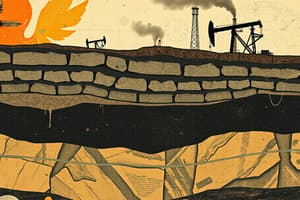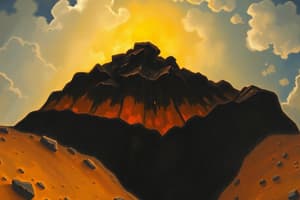Podcast
Questions and Answers
What is the primary material that coal forms from?
What is the primary material that coal forms from?
- Organic waste from modern animals
- Remains of ancient sea creatures
- Remains of ancient plants (correct)
- Minerals from sedimentary layers
Which type of coal has the highest carbon content and energy density?
Which type of coal has the highest carbon content and energy density?
- Lignite
- Bituminous
- Peat
- Anthracite (correct)
What is one of the primary environmental impacts of burning coal?
What is one of the primary environmental impacts of burning coal?
- Noise pollution
- Release of sulfur dioxide (correct)
- Depletion of ozone layer
- Soil erosion
What product can petroleum be refined into?
What product can petroleum be refined into?
Natural gas is primarily composed of which gas?
Natural gas is primarily composed of which gas?
Which of the following is NOT a product derived from petroleum?
Which of the following is NOT a product derived from petroleum?
What is one use of coal in industrial applications?
What is one use of coal in industrial applications?
Which renewable energy source is NOT mentioned as an alternative to fossil fuels?
Which renewable energy source is NOT mentioned as an alternative to fossil fuels?
What issue is commonly associated with the extraction of petroleum?
What issue is commonly associated with the extraction of petroleum?
What indicates the initial stage of coal formation?
What indicates the initial stage of coal formation?
Flashcards are hidden until you start studying
Study Notes
Introduction to Fossil Fuels
- Fossil fuels are natural resources derived from the remains of ancient organisms buried under layers of earth.
- The primary types include coal, petroleum (crude oil), and natural gas.
Coal
- Forms from the remains of ancient plants due to heat and pressure over millions of years.
- Types of coal:
- Peat: The initial stage of coal, low in carbon.
- Lignite: Also known as brown coal, with low carbon content.
- Bituminous: Black coal with a higher carbon content, widely used for electricity generation.
- Anthracite: The highest grade of coal, possessing the highest carbon content and energy density.
- Main uses encompass electricity generation, steel production, and as fuel for various industries.
- Burning coal results in pollutants such as sulfur dioxide and carbon dioxide, contributing to air pollution and climate change.
Petroleum
- Forms from the remains of microscopic sea creatures and plants that become buried under sedimentary layers over millions of years.
- Composed primarily of hydrocarbons, which can be refined into multiple products.
- Applications include fuels like gasoline, diesel, and jet fuel, along with plastics, synthetic fibers, and lubricants.
- Environmental impacts include risks of oil spills, air pollution, and greenhouse gas emissions resulting from extraction and combustion.
Natural Gas
- Often found alongside petroleum, consisting mainly of methane.
- Recognized as a cleaner alternative to coal and oil.
- Uses extend to heating, electricity generation, and as feedstock in various industrial applications.
Alternative Energy Sources
- Renewable energy sources such as solar, wind, hydro, and geothermal energy are being explored to reduce fossil fuel dependence.
- Benefits of renewable sources include lower greenhouse gas emissions and enhanced sustainability over the long term.
Conservation and Future Outlook
- Conservation of fossil fuel usage is vital for environmental protection and combating climate change.
- Ongoing research aims to develop cleaner energy technologies and find more efficient methods to utilize fossil fuels.
Studying That Suits You
Use AI to generate personalized quizzes and flashcards to suit your learning preferences.




